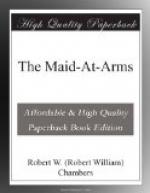“Are there no officers here to cuff their ears!” muttered Mount, in disgust.
“Bah!” sneered Elerson; “officers can’t teach militia—only a thrashing does ’em any good. After all, our people are like the British, full o’ contempt for untried enemies. Do you recall how the red-coats went swaggering about that matter o’ Bunker Hill? They make no more frontal attacks now, but lay ambuscades, and thank their stars for the opportunity.”
A soldier, driving an ox-team behind us, began to sing that melancholy ballad called “St. Clair’s Defeat.” The entire company joined in the chorus, bewailing the late disaster at Ticonderoga, till Jack Mount, nigh frantic with disgust, leaped up into the cart and bawled out:
“If you must sing, damn you, I’ll give something that rings!”
And he lifted his deep, full-throated voice, sounding the marching song of “Morgan’s Men.”
“The Lord He is
our rampart and our buckler and our shield!
We must aid Him cleanse
His temple; we must follow Him afield.
To His wrath we leave
the guilty, for their punishment is sure;
To His justice the downtrodden,
for His mercy shall endure!”
And out of the darkness the ringing chorus rose, sweeping the column from end to end, and the echoing drums crashed amen!
Yet there is a time for all things—even for praising God.
XVIII
ORISKANY
It is due, no doubt, to my limited knowledge of military matters and to my lack of practical experience that I did not see the battle of Oriskany as our historians have recorded it; nor did I, before or during the affair, notice any intelligent effort towards assuming the offensive as described by those whose reports portray an engagement in which, after the first onset, some semblance of military order reigned.
So, as I do not feel at liberty to picture Oriskany from the pens of abler men, I must be content to describe only what I myself witnessed of that sad and unnecessary tragedy.
For three days we had been camped near the clearing called Oriska, which is on the south bank of the Mohawk. Here the volunteers and militia of Tryon County were concentrating from Fort Dayton in the utmost disorder, their camps so foolishly pitched, so slovenly in those matters pertaining to cleanliness and health, so inadequately guarded, that I saw no reason why our twin enemies, St. Leger and disease, should not make an end of us ere we sighted the ramparts of Stanwix.
All night long the volunteer soldiery had been in-subordinate and riotous in the hamlet of Oriska, thronging the roads, shouting, singing, disputing, clamoring to be led against the enemy. Popular officers were cheered, unpopular officers jeered at, angry voices raised outside headquarters, demanding to know why old Honikol Herkimer delayed the advance. Even officers shouted, “Forward! forward! Wake up Honikol!” And spoke of the old General derisively, even injuriously, to their own lasting disgrace.




